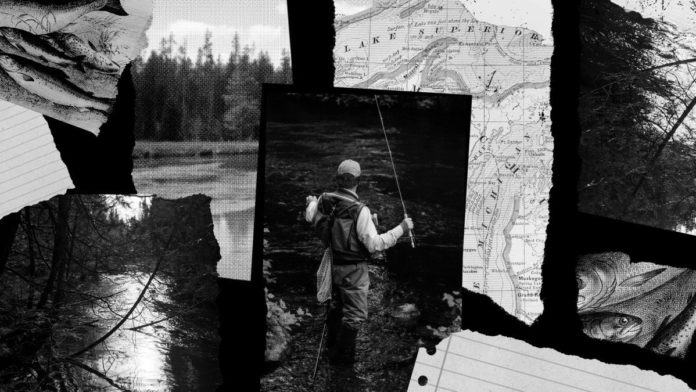Richard was born in Pontiac in postwar 1945, on the cusp of prosperous times for the country—and the Motor City itself. Home movies show him in hyperkinetic infancy, struggling to jump from a high chair, mauling bars of a playpen, determined to escape anything holding him in. There are scenes of him at age two brazenly slapping the family’s immense collie, at three pedaling a trike twice his size, and at about five or six working the oars of a full-size rowboat in one of northern Michigan’s lakes, each pull forceful enough to raise him off his seat.
You could almost see him exorcising some other force that had already taken hold. Anti-Semitism was rampant—Detroit’s Father Charles Coughlin, the Radio Priest, spewed anti-Jewish sentiment to a nationwide audience from a local radio station, WJR—and Pontiac’s Jewish community circled its wagons. My grandparents were leaders in that world: he was a shoe retailer, she worked alongside him, and they devoted much of their lives to a small reform congregation. My grandfather, a native of Tuscaloosa who had dropped out of the University of Alabama’s law school to earn a living, was rabbinic in his pursuit of knowledge. His son was not.
Even as a child, Richard was the profane to my grandfather’s sacred. My grandmother, a tall, regal, gracious woman, made peace in the household. My mother, who was six years older than Richard, was strong-willed herself but went off to college when he was only 11.
That was the same year my grandfather suffered the first of the heart attacks and strokes that would eventually kill him. In Richard’s last note, he referred to his father’s initial heart attack as “the Day the Music Died.”
From that day on life in our home was forever grim—constant worries about my dad’s health, constant worries about money. I vowed to myself then that when life became grim for me, I wouldn’t stay around.
He was shaving and besotted by girls at 13, the year he was bar mitzvahed, and he tried to talk Rick and Steve into jumping off the garage roof. He became a sometime brawler at Pontiac Central, played football and tennis, acted in school plays, and was charismatic enough to pick up girls at Ted’s, Woodward Avenue’s famous drive-in burger joint. Rick described him variously as a stallion, a rebel, and a bad boy.
He attended Miami of Ohio and joined a frat. In the summer of 1967, between college and law school, he moved to San Francisco, lived in the Haight, and found work moving furniture. He once told me that he didn’t partake in the Summer of Love because he found most of the hippies to be privileged Jewish kids from the suburbs. In June of 1968, the same year he entered law school, he married a high school girlfriend he’d met at a synagogue mixer. She filed for divorce two years later. He passed the bar the same year and became an assistant prosecutor. He got a draft number but was exempted from Vietnam because of a chronic skin condition. He married a social worker from the courts in ’72 and became a defense attorney in ’73. Three years later, his wife left him because he was having an affair.
He didn’t do feelings and was allergic to sentimentality. But most people found him kind and giving, both of his money and his time. He volunteered for the Special Olympics and the Humane Society. He taught at a community college. He hosted summer barbecues: steaks and drinks all around. Women, especially those newly out of relationships, found him charismatic, intense, and fun. Men and children liked him because he was jolly and playful. He could listen to someone’s woes without becoming self-referential. He avowed love of his family, especially my mother. When he was good, he was very good.
But he was driven by a hunger for sex that never seemed to abate. “What he wanted to become was someone irresistible to women,” Steve told me. “He wanted to get the sex that resulted from it, but even if it didn’t, he still wanted to be that person that women would think: I would like to go to bed with that guy.” Or, as he told someone not long before his death, “I’m a mother’s worst nightmare.”
There was more. When he was in his thirties, he told a legal secretary that he’d been sexually abused by a man at summer camp. “I didn’t realize it was molestation,” he told her. “It felt pretty good to me.”
Meanwhile, as a defense attorney, he defended men who’d been accused of date rape so deviously well that some questioned his morality, including me. He once told Steve that the key was jury selection. “I want women on the jury—working women,” he said. “I want cashiers. I want low-end salesclerks. Because they are harder on other women than any man could ever be. Their attitude is, Honey, if you weren’t looking for it, what the hell were you doing up in his room at 11 o’clock at night?” His lawyering and womanizing seemed to be part of the same unseemly, sometimes repugnant ethical system, and this is where we parted ways.
His ex-wives and family members confirmed that he was burdened by incredible pressure from his parents, both of whom were exquisitely conscious of the opinions of others. He was an ambivalent Jew, acutely aware of the religion to which he’d been born, dutifully attending the Passover seder my mother held every year, but he shied from a Yiddish term that my grandmother often attached to others: mensch. A mensch, at least in my family’s cosmology, could be counted on to do the right thing, to be the perfect father, breadwinner, community member. A mensch he assumed he was not, and I gathered that he never believed he could be.
As for his suicide email: it was full of bravado and clichés, but because it was the only clue he left behind, it was deconstructed by family and friends, with many interpretations advanced and contradicted. Some viewed the note as a red herring, his death less the triumphal leap he made it out to be than a piteous shuffle away from life. Others assumed he was either physically or mentally ill, or both, although he’d shown little sign of either problem. Another camp took the note at face value, because Richard had proclaimed occasionally that he didn’t care to grow old and had once told a friend that there would be no better way to die than in a trout stream.
I didn’t know what to think. His death seemed consistent with a certain inborn selfishness and stubbornness, but it smelled more like a tragic act born of despair.
Had he suffered vicarious trauma from a career as a criminal defense attorney? Was he a narcissist who couldn’t deal with his fading looks, bad knees, loss of money—too vain or depressed to begin again? He’d told some friends he’d lost his interest in sex, a possible side effect of medication, depression, or age. From my mother, we know he was on medication to stave off panic attacks, which he suffered in part from worrying that he would have a heart attack and collapse in court. He had suffered a cataclysmic financial setback, which, if exposed, would strip him of persona and lifestyle. As Philip Roth once wrote of a libidinous middle-aged male character: “There was no unsnarling an existence whose waywardness constituted its only authority and provided its primary amusement.”
“What a fucking waste,” one of his ex-wives told me, summing up what he’d done to himself. “What a fucking waste.”
Credit: Source link






























